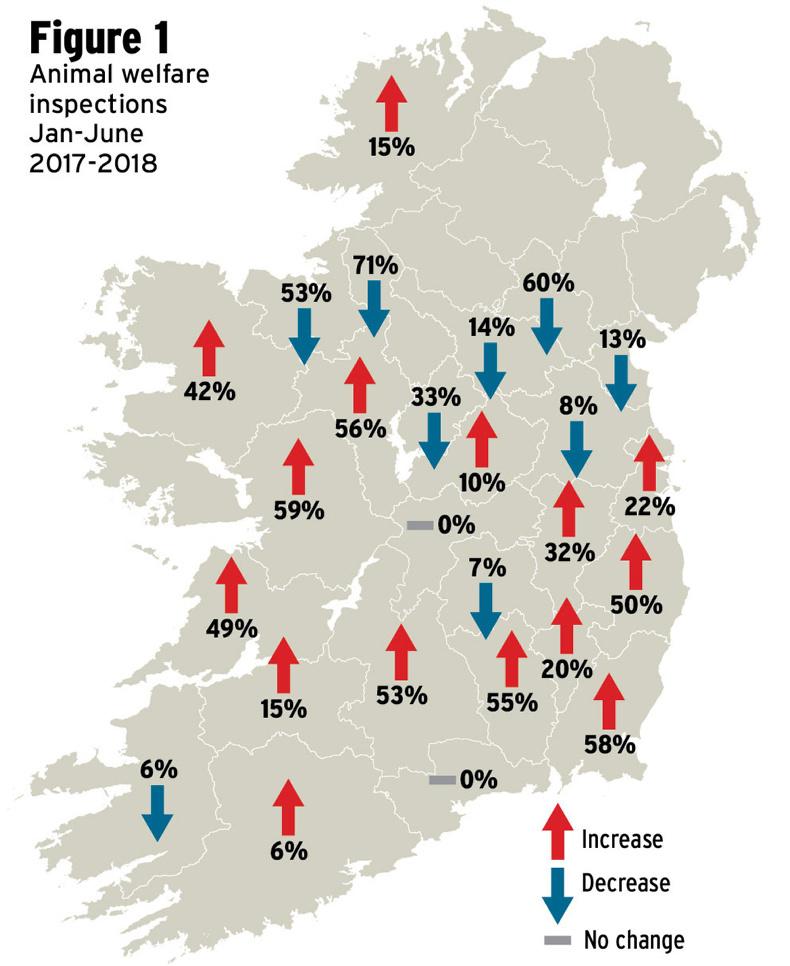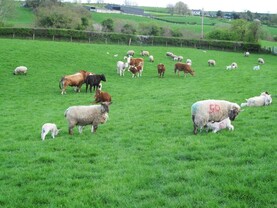Some 1,267 animal welfare inspections were carried out nationwide by the Department of Agriculture from January to June of this year.
The figure marks a 20% jump in the number of inspections on the same period in 2017.
Figures from the Department show that Galway had the highest number of for the period with 198, a 59% increase on 2017.
Cork (145) and Mayo (102) received the second and third highest number of inspections.
In some counties such as Wicklow and Wexford, inspections more than doubled, while in Monaghan the number fell to 25. In Leitrim, just eight inspections were carried out.

Convictions
Although inspections increased across the country, the number of people convicted between January to June for breaching animal welfare rules dropped from 21 last year to 11 this year.
Four people were disqualified from keeping animals in 2017. This rose to five people this year.
“A wide range of sanctions were applied including fines and suspended jail sentences,” a spokesperson for the Department told the Irish Farmers Journal.
It is thought the increase in the number of on-farm bovine deaths reported for the first half of this year triggered the increase in inspections.
Tough weather conditions and prolonged housing in the spring increased disease outbreaks, resulting in 210,143 on-farm cattle deaths being reported between January and June this year – an increase of 17% on 2017.
At the beginning of September, the Department launched a draft document for a national strategy on animal welfare.
A number of actions were recommended, including the possibility of adapting and increasing the number of animal welfare measures in Quality Assurance Schemes.
Given increased societal concerns around farm animal welfare, the Department is welcoming further submissions until 31 October.
“With such a large population of animals in Ireland operating in so many different aspects of Irish life, animal welfare is an area that will always require attention,” Minister for Agriculture Michael Creed said.
Read more
18% increase in fallen cattle this spring
‘Bills are yet to be paid’ – banks offer drought support
Some 1,267 animal welfare inspections were carried out nationwide by the Department of Agriculture from January to June of this year.
The figure marks a 20% jump in the number of inspections on the same period in 2017.
Figures from the Department show that Galway had the highest number of for the period with 198, a 59% increase on 2017.
Cork (145) and Mayo (102) received the second and third highest number of inspections.
In some counties such as Wicklow and Wexford, inspections more than doubled, while in Monaghan the number fell to 25. In Leitrim, just eight inspections were carried out.

Convictions
Although inspections increased across the country, the number of people convicted between January to June for breaching animal welfare rules dropped from 21 last year to 11 this year.
Four people were disqualified from keeping animals in 2017. This rose to five people this year.
“A wide range of sanctions were applied including fines and suspended jail sentences,” a spokesperson for the Department told the Irish Farmers Journal.
It is thought the increase in the number of on-farm bovine deaths reported for the first half of this year triggered the increase in inspections.
Tough weather conditions and prolonged housing in the spring increased disease outbreaks, resulting in 210,143 on-farm cattle deaths being reported between January and June this year – an increase of 17% on 2017.
At the beginning of September, the Department launched a draft document for a national strategy on animal welfare.
A number of actions were recommended, including the possibility of adapting and increasing the number of animal welfare measures in Quality Assurance Schemes.
Given increased societal concerns around farm animal welfare, the Department is welcoming further submissions until 31 October.
“With such a large population of animals in Ireland operating in so many different aspects of Irish life, animal welfare is an area that will always require attention,” Minister for Agriculture Michael Creed said.
Read more
18% increase in fallen cattle this spring
‘Bills are yet to be paid’ – banks offer drought support







 This is a subscriber-only article
This is a subscriber-only article








SHARING OPTIONS: